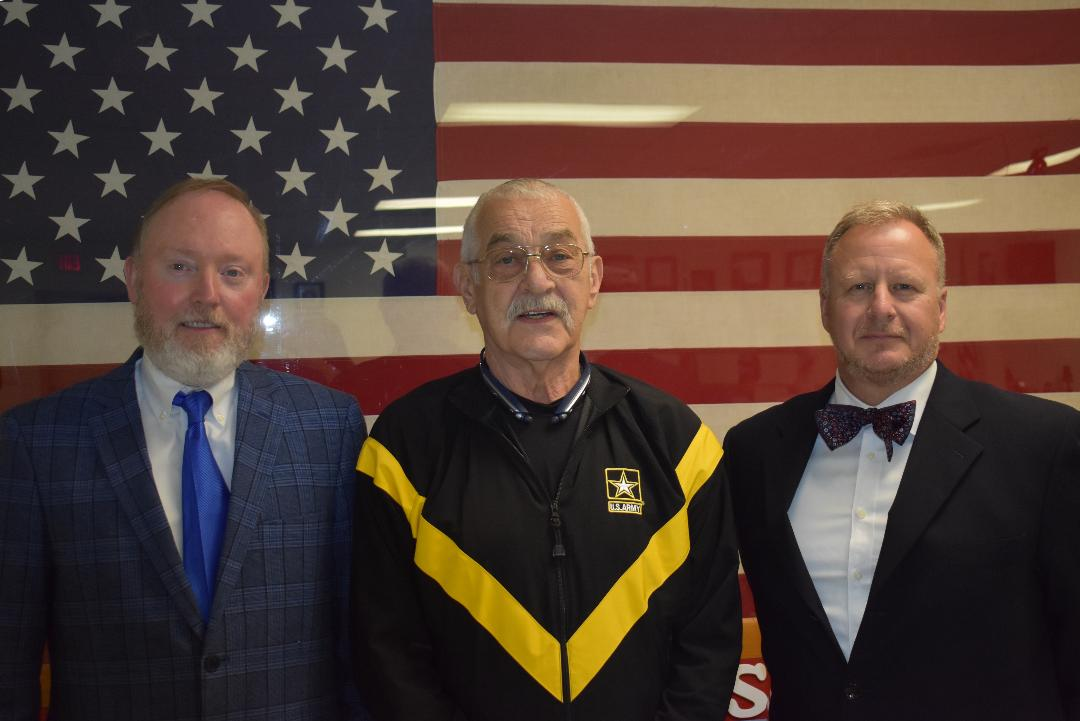Circuit Judge Gregory Nicholas, left, and District Judge Wells “Rusty” Turner, right, with VFW Post 2214's Will Harris, center, Monday evening (W.C. Mann for The Cullman Tribune)
Editor’s note: This story is the first in a series on veterans leading up to Veterans Day on Nov. 11.
CULLMAN – On Monday evening, Circuit Judge Gregory Nicholas and District Judge Wells “Rusty” Turner, along with Cullman County District Attorney Wilson Blaylock, held a meeting with members of Veterans of Foreign Wars (VFW) Post 2214 to discuss and plan for the establishment of a veterans’ court in Cullman County, based on existing programs in other parts of Alabama, particularly nearby Madison County. The court will offer a diversion program for veterans who have committed nonviolent crimes, with a focus on helping those dealing with substance abuse, traumatic brain injuries or mental health issues related to their service, especially combat deployments. Veterans’ courts do not dismiss criminal charges but seek to get to the root causes of criminal behavior in order to break cycles that land vets back in jail or escalate into worse problems.
Veterans, especially those who have been deployed, tend to suffer higher rates of mental illness and substance dependency than the general population, and a veteran commits suicide in Alabama every two to three days, according to the most recent available data.
An Alabama model for a veterans’ court
While the judges did not state an intention to duplicate the Madison County program, they did point to it as a model that could inform the creation of such a program here.
In its program application, the Madison County Veterans’ Court describes itself as “a diversionary program designed specifically for veterans of the United States Armed Forces who have been charged with criminal offenses.”
The program is geared toward veterans who are charged with non-violent offenses. Applicants cannot have been charged with a Class A felony or a crime that resulted in serious injury to the victim. Once in the Madison County program, participants have one chance; they may not repeat.
The description continues: “The Veterans’ Court program will typically be an average of at least twelve months in duration for a given participant. The program will require at least monthly appearances before the Veterans Court judge coupled with at least monthly meetings with a participant’s counselor and/or mentor. A participant will likely be required to participate in medical and mental health services, job training and professional services, academic and/or vocational skill improvement services and whatever counseling is designated for a participant. Furthermore, any substance abuse counseling or treatment that is recommended or required must be attended and completed as dictated by the Court or its referral officers. Finally, the participant will be responsible to pay any court ordered monies, costs and fees associated with the underlying charges, to include restitution and counseling services. Failure at any phase, as discussed herein, may result in further sanctions, penalties, counseling, treatment or dismissal from the program.”
Participants are also subjected to regular drug screens and are expected to refrain from the consumption of alcohol.
Veterans in the program pass through three phases:
- “Initiation and Structure”: “After (a) plea of guilty and a suspension of sentencing by the Court, the veteran in this phase will undergo intense evaluation, strict and robust guidelines and endure a very restrictive regimen that will consist of counseling, appropriate screening and frequent contact with the Court.” The veteran meets with the court twice a month, and out-of-state travel is prohibited without court permission.
- “Reform”: “The veteran in this phase will have less structure than in Phase I wherein they will be forced to make more independent decisions and their own judgment and discipline will undergo a more random evaluation. Counseling, screening and contact with the court will remain a part of the veteran’s program, but evaluation will likely be less frequent. The veteran will meet with the Court only once a month. Travel outside the state is expressly prohibited unless approved by the Court.”
- “Independence and Graduation”: “The veteran in this phase will have less supervision than the previous phases and may even go unsupervised for periods of time. All veterans are still subject to random screening and appearances before the Court upon request or schedule. Counseling must continue as required and such will be evaluated on a case-by-case basis. The veteran will meet with the Court once a month at the most and will likely only have contact, if any, with a Veterans Court Mentor periodically. Upon completion of this phase a veteran will become a graduate. Graduation will be at a set time and date before the Court and ceremony.”
The length of time in each phase can vary based on each participant’s progress, and non-compliance with rules can result in numerous sanctions, including demotion to an earlier phase, delay of program completion, detention at home or in a facility, or dismissal from the program.
Having veterans as mentors the key to success
A veterans’ court will partner with local law enforcement, mental health services, veterans’ services agencies and others to bring resources together from a broad range of disciplines to help participants, but the main points of contact between veterans and the program are other veterans who serve as mentors.
According to Nicholas, “We’re really fortunate, I think, in this county that we do have people in the DA’s office, and the judges, and the law enforcement that are committed to veterans. And this concept is something that we’re all invested in, but it’s really not going to work without the mentors. The mentors really are the heart and soul of this program, because they provide the tools that are necessary to help that individual that has run afoul of the law kind of navigate through the judicial system.
“Now, again, the mentors are very helpful; they’re going to help navigate. They’re not going to be therapists, they’re not going to be lawyers, but they’re still going to be instrumental, really, in helping the veterans’ court program succeed.”
In many veterans’ courts across the country, mentors do not have to be veterans themselves, but the judges and local VFW post hope to see Cullman County’s mentors come from the veteran community. All present at the meeting agreed that veterans and their families in times of crisis would benefit from having people with them who understand their experiences, are familiar with the military lifestyle and can speak the language.
Volunteers will undergo training led by instructors from established veterans’ court programs.
Starting small, thinking big
The court officials said that, for now, the plan is to start with veterans involved in criminal cases. Over time, they hope to expand the program to include those dealing with family issues like child custody.
Doing right by veterans
Nicholas told the group, “Here’s the situation: we can always lock people up, and if locking people up was the only answer, we could do that. But what happens is we lock people up, and they’re going to serve their time. They’re going to be accountable–and they’re going to be accountable even in the veterans’ court, because I think that’s important for that individual and it’s certainly important for our community that people be accountable for their choices.
“But by addressing the underlying problem, whatever that may be–if it’s drugs, we can look at that; if the underlying problem is some kind of post-traumatic stress syndrome–if we address that problem, then they’re not going to reoffend. So community safety is going to be enhanced, and certainly that individual veteran’s life is going to be better, because they’re not going to have the same problems that they’ve experienced, if we give them the treatment that they, quite frankly, earned.
“They were serving us. In most cases, that’s why they’re in the predicament that they’re in, because of their experiences, especially in a combat situation. So I think it’s important for us as a community to keep faith with those veterans that have really served us. I think it’s our opportunity to turn around and try to make sure that we do right by them, as well.”
Get involved
Cullman’s court officials and VFW Post 2214 have formed a committee to help establish the Cullman County Veterans’ Court, and they are seeking mentors. If you are a veteran and are interested in helping other veterans through the mentoring program, contact VFW Post 2214 Commander Will Harris at 256-739-6611 or email twodogwill@hotmail.com.
Copyright 2018 Humble Roots, LLC. All Rights Reserved.





















